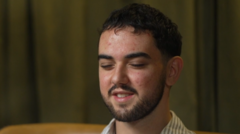When Calum Macdonald crossed into Vietnam after a trip to Vang Vieng, Laos, he was met with a frightening realization: he could see nothing, only a "kaleidoscopic blinding light." The day prior, he and his friends had enjoyed complimentary shots of whisky and vodka at a hostel, unaware of the lurking danger of methanol poisoning. It wasn't until they reached their hotel that Calum voiced his confusion to his friends, who noted the lights were already on—he was blind.
Calum, now 23, is speaking out for the first time about the incident that left him permanently blind, following a series of tragic events leading to the deaths of six individuals in the area last November. Among the deceased were two Danish women he had befriended during his stay. The group, including Calum, were guests at the Nana Backpacker Hostel, which has since been identified as a source of contaminated alcohol.
The families of the victims, including Simone White, who died after sharing drinks in the same hostel, are pressing the British Foreign Office for clearer warnings about the dangers associated with consuming alcohol in Southeast Asia. Simone, who believed she was enjoying the "best holiday of her life," was left in a coma and subsequently passed away, leaving her mother devastated.
Methanol, frequently found in industrial products, is devastatingly toxic when ingested. Unlike ethanol in beverages, methanol can be lethal even in small amounts, as it is metabolized differently by the human body. Symptoms of methanol poisoning, which can be mistaken for hangover effects, may escalate to severe complications like seizures and irreversible blindness if not treated swiftly.
Kirsty McKie, a Bali resident who succumbed to methanol poisoning in 2022, also serves as a somber reminder of the dangers. Her friend who shared drinks with her survived, raising an unbearable “what if?” for those left behind. Similarly, Cheznye Emmons lost her life after consuming gin tainted with an astronomical 66,000 times the legal limit of methanol.
Calum urges caution, recommending travelers steer clear of free drinks and opt instead for safer choices like local beers. His perspective on life has shifted dramatically following the loss of his friends, as he grapples with the duality of surviving a tragedy that claimed so many others.
In his quest to find meaning in his blindness, he aims to advocate for those unaware of these perils. Meanwhile, the Foreign Office acknowledges the risk of methanol poisoning among counterfeit alcohol and professes to collaborate with local authorities to enhance traveler safety.
The struggles of Calum and the bereaved families highlight an urgent call for awareness and preventative measures to protect future travelers from similar, heart-wrenching experiences in Southeast Asia.



















